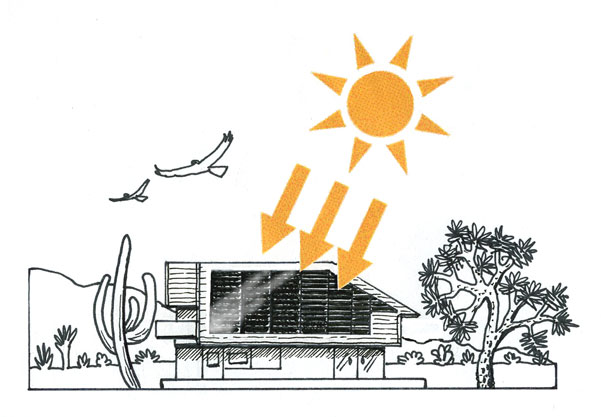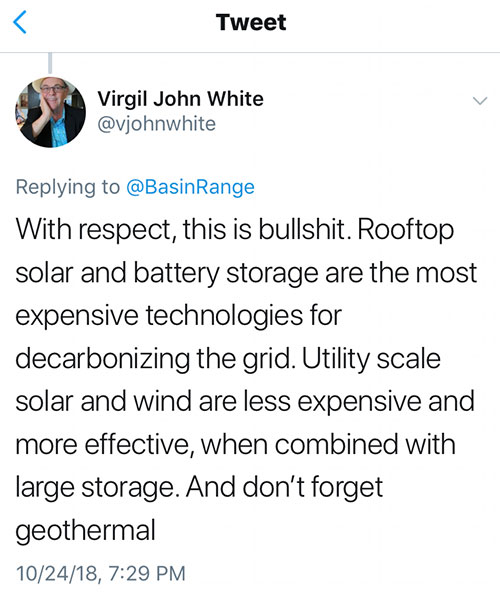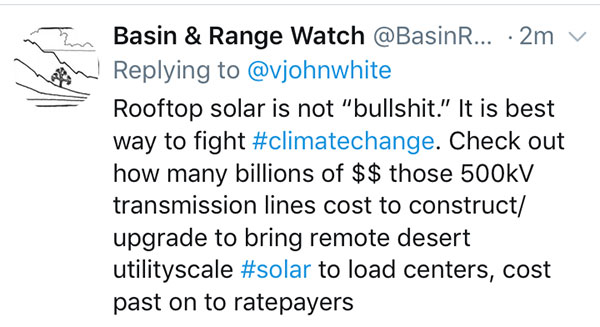Questioning Renewable Energy Portfolio Standards Now That Do Not Include Rooftop Solar

October 29, 2018 - Nevada - Several states are ramping up Renewable Energy Portfoolio Standards (RPS for short), to increase renewable energy on their grids. But many are too broad, and we are concerned will lead to more bulldozing of valuable desert habitats. In the past ten years we have seen the default choice of solar developers go onto public lands desert ecosystems and grasslands, while rooftop solar alternatives fall by the wayside (often because of unfavorable policies rigged by utilities).
The company proposing to build Crescent Peak Wind Project is backing Nevada's Question 6 which would amend the constitution to require electric utilities to acquire 50 percent of their electricity from renewable resources by 2030. While that initially sounds good, huge developers are hovering around this one like Eolus Wind. They would build the Crescent Peak Wind Project next to the Mojave National Preserve. Question 6 says nothing about developing renewable energy on rooftops and old mine sites. If it passes, Eolus will have a much easier time getting a Power Purchas Agreement to build 600 foot turbines next to Mojave National Preserve and Wee Thump Wilderness.
Eolus, the Swedish wind company proposing to build the ill-sited Crescent Peak Wind Project in southern Nevada, wrote a supportive opinion piece on Question 6 in Nevada, that would raise the RPS to 50% but without a rooftop solar or Distributed Energy Resources carveout.
Our FOIA requests are showing that Bureau of Land Management is working closely with Eolus Wind to approve the project. The Bureau of Land Management is not considering an Area of Critical Environmental Concern alternative or a wind free alternative and has told the company they are trying to make their project as successful as possible. If Question 6 passes, you may see this huge development next to the Mojave National Preserve.
Arizona's RPS includes a requirement that utilities must meet 4.5% of total retail sales from distributed generation. One half of the DG requirement must come from residential sources and the other half must come from non-residential, non-utility sources. This is a small rooftop solar carve-out, but it is a good start, and one Nevada should consider before we support any RPS here. See more on carve-outs.
Nevada's Question 6 is a vague amendment that does nothing to foster energy democracy in the Silver State. Germany was able to vastly increased Distributed Solar Generation by enacting laws giving a fair margket price to residential generators, as well as mandating free access to the grid. This is a far cry from what NV Energy has done to penalize any Community Choice Aggregators for their use of microgrids, or punishing resodential rooftop solar generators.
We need Renewable Energy Democracy, not caps on net-energy metering, grid fees, declining prices paid to residential solar energy generators, utility monopolies, and relying on companies to build renewables. In an era of climate change emergency, much more consideration should be given to local energy generation in the built environment.
What surprises us the most is how many environmentalists question Distributed Energy Resources, such as rooftop solar, as not viable. Which is simply untrue. We need a diversity of renewable energy, especially in light of the overgeneration problem in California, where storage will be ever more important.


